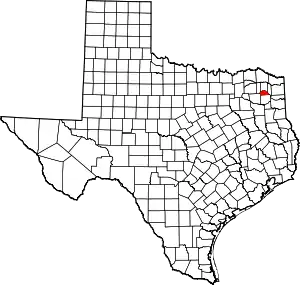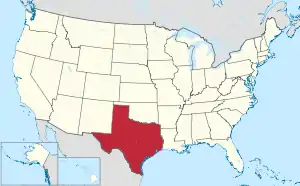Camp County | |
|---|---|
.jpg.webp) Camp County Courthouse in Pittsburg | |
 Location within the U.S. state of Texas | |
 Texas's location within the U.S. | |
| Coordinates: 32°58′N 94°59′W / 32.97°N 94.98°W | |
| Country | |
| State | |
| Founded | 1874 |
| Named for | John Lafayette Camp |
| Seat | Pittsburg |
| Largest city | Pittsburg |
| Area | |
| • Total | 203 sq mi (530 km2) |
| • Land | 196 sq mi (510 km2) |
| • Water | 7.4 sq mi (19 km2) 3.6% |
| Population (2020) | |
| • Total | 12,464 |
| • Density | 61/sq mi (24/km2) |
| Time zone | UTC−6 (Central) |
| • Summer (DST) | UTC−5 (CDT) |
| Congressional district | 1st |
| Website | www |
Camp County is a county in the eastern part of Texas. As of the 2020 census, its population was 12,464.[1] Its seat is Pittsburg.[2] The county was founded in 1874 and is named for John Lafayette Camp, a Texas politician.
Geography
According to the U.S. Census Bureau, the county has a total area of 203 square miles (530 km2), of which 7.4 square miles (19 km2) (3.6%) are covered by water.[3] It is the third smallest county by area in Texas.
Major highways
Adjacent counties
- Titus County (north)
- Morris County (east)
- Upshur County (south)
- Wood County (southwest)
- Franklin County (west)
Communities
City
- Pittsburg (county seat)
Town
Unincorporated communities
Ghost town
- Crossroads
- Holly Springs
- Matinburg
Demographics
| Census | Pop. | Note | %± |
|---|---|---|---|
| 1880 | 5,951 | — | |
| 1890 | 6,624 | 11.3% | |
| 1900 | 9,146 | 38.1% | |
| 1910 | 9,551 | 4.4% | |
| 1920 | 11,103 | 16.2% | |
| 1930 | 10,063 | −9.4% | |
| 1940 | 10,285 | 2.2% | |
| 1950 | 8,740 | −15.0% | |
| 1960 | 7,849 | −10.2% | |
| 1970 | 8,005 | 2.0% | |
| 1980 | 9,275 | 15.9% | |
| 1990 | 9,904 | 6.8% | |
| 2000 | 11,549 | 16.6% | |
| 2010 | 12,401 | 7.4% | |
| 2020 | 12,464 | 0.5% | |
| U.S. Decennial Census[4] 1850–2010[5] 2010–2020[1] | |||
| Race / Ethnicity | Pop 2010[6] | Pop 2020[7] | % 2010 | % 2020 |
|---|---|---|---|---|
| White alone (NH) | 7,298 | 6,734 | 58.85% | 54.03% |
| Black or African American alone (NH) | 2,133 | 1,877 | 17.20% | 15.06% |
| Native American or Alaska Native alone (NH) | 38 | 28 | 0.31% | 0.22% |
| Asian alone (NH) | 59 | 105 | 0.48% | 0.84% |
| Pacific Islander alone (NH) | 17 | 8 | 0.14% | 0.06% |
| Some other race alone (NH) | 4 | 34 | 0.03% | 0.27% |
| Mixed/multiracial (NH) | 204 | 456 | 1.65% | 3.66% |
| Hispanic or Latino (any race) | 2,648 | 3,222 | 21.35% | 25.85% |
| Total | 12,401 | 12,464 | 100.00% | 100.00% |
Note: the US Census treats Hispanic/Latino as an ethnic category. This table excludes Latinos from the racial categories and assigns them to a separate category. Hispanics/Latinos can be of any race.
According to the census of 2000, 11,549 people, 4,336 households, and 3,156 families were living in the county.[8] The population density was 58 people per square mile (22 people/km2). The 5,228 housing units had an average density of 26 per square mile (10/km2). The racial makeup of the county was 69.53% White, 19.20% African American, 0.35% Native American, 0.17% Asian, 9.68% from other races, and 1.07% from two or more races; 14.78% of the population were Hispanics or Latinos of any race.
Up from 2000's population of 11,549 people, and 2010's 12,401 residents, Camp County grew to 12,464 at the 2020 U.S. census.[1] Among the 2020 population, its racial and ethnic makeup was 54.03% non-Hispanic White, 15.06% Black or African American, 0.22% Native American, 0.84% Asian, 0.06% Pacific Islander, 0.27% some other race, 3.66% multiracial, and 25.85% Hispanic or Latino of any race.[7] Like the majority of the United States at the time, these represented the demographic trends as the U.S. experienced great diversification.[9]
Politics
Camp County is represented in the Texas Senate by Republican Bryan Hughes, a lawyer in Mineola.
| Year | Republican | Democratic | Third party | |||
|---|---|---|---|---|---|---|
| No. | % | No. | % | No. | % | |
| 2020 | 3,626 | 71.66% | 1,394 | 27.55% | 40 | 0.79% |
| 2016 | 3,201 | 70.48% | 1,260 | 27.74% | 81 | 1.78% |
| 2012 | 2,881 | 66.46% | 1,428 | 32.94% | 26 | 0.60% |
| 2008 | 2,798 | 61.27% | 1,734 | 37.97% | 35 | 0.77% |
| 2004 | 2,638 | 59.43% | 1,778 | 40.05% | 23 | 0.52% |
| 2000 | 2,121 | 56.05% | 1,625 | 42.94% | 38 | 1.00% |
| 1996 | 1,488 | 40.63% | 1,912 | 52.21% | 262 | 7.15% |
| 1992 | 1,219 | 30.63% | 1,938 | 48.69% | 823 | 20.68% |
| 1988 | 1,908 | 47.20% | 2,121 | 52.47% | 13 | 0.32% |
| 1984 | 2,238 | 53.69% | 1,917 | 45.99% | 13 | 0.31% |
| 1980 | 1,531 | 42.32% | 2,052 | 56.72% | 35 | 0.97% |
| 1976 | 1,133 | 34.49% | 2,146 | 65.33% | 6 | 0.18% |
| 1972 | 1,599 | 60.55% | 1,041 | 39.42% | 1 | 0.04% |
| 1968 | 555 | 19.13% | 1,272 | 43.85% | 1,074 | 37.02% |
| 1964 | 729 | 28.29% | 1,841 | 71.44% | 7 | 0.27% |
| 1960 | 873 | 39.68% | 1,307 | 59.41% | 20 | 0.91% |
| 1956 | 958 | 47.22% | 1,053 | 51.90% | 18 | 0.89% |
| 1952 | 951 | 38.24% | 1,535 | 61.72% | 1 | 0.04% |
| 1948 | 180 | 12.10% | 923 | 62.03% | 385 | 25.87% |
| 1944 | 180 | 13.16% | 977 | 71.42% | 211 | 15.42% |
| 1940 | 200 | 12.94% | 1,343 | 86.93% | 2 | 0.13% |
| 1936 | 78 | 7.67% | 939 | 92.33% | 0 | 0.00% |
| 1932 | 73 | 4.90% | 1,416 | 94.97% | 2 | 0.13% |
| 1928 | 494 | 43.56% | 640 | 56.44% | 0 | 0.00% |
| 1924 | 187 | 13.21% | 1,186 | 83.76% | 43 | 3.04% |
| 1920 | 156 | 11.81% | 661 | 50.04% | 504 | 38.15% |
| 1916 | 206 | 21.37% | 721 | 74.79% | 37 | 3.84% |
| 1912 | 155 | 22.46% | 472 | 68.41% | 63 | 9.13% |
See also
References
- 1 2 3 "U.S. Census Bureau QuickFacts: Camp County, Texas". United States Census Bureau. Retrieved January 31, 2022.
- ↑ "Find a County". National Association of Counties. Archived from the original on May 31, 2011. Retrieved June 7, 2011.
- ↑ "2010 Census Gazetteer Files". United States Census Bureau. August 22, 2012. Retrieved April 20, 2015.
- ↑ "Decennial Census of Population and Housing by Decades". US Census Bureau.
- ↑ "Texas Almanac: Population History of Counties from 1850–2010" (PDF). Texas Almanac. Archived (PDF) from the original on October 9, 2022. Retrieved April 20, 2015.
- ↑ "P2 HISPANIC OR LATINO, AND NOT HISPANIC OR LATINO BY RACE - 2010: DEC Redistricting Data (PL 94-171) - Camp County, Texas". United States Census Bureau.
- 1 2 "P2 HISPANIC OR LATINO, AND NOT HISPANIC OR LATINO BY RACE - 2020: DEC Redistricting Data (PL 94-171) - Camp County, Texas". United States Census Bureau.
- ↑ "U.S. Census website". United States Census Bureau. Retrieved May 14, 2011.
- ↑ "A Changing Country". The New York Times. August 13, 2021. ISSN 0362-4331. Retrieved April 21, 2022.
- ↑ Leip, David. "Dave Leip's Atlas of U.S. Presidential Elections". uselectionatlas.org. Retrieved July 20, 2018.
External links
![]() Media related to Camp County, Texas at Wikimedia Commons
Media related to Camp County, Texas at Wikimedia Commons